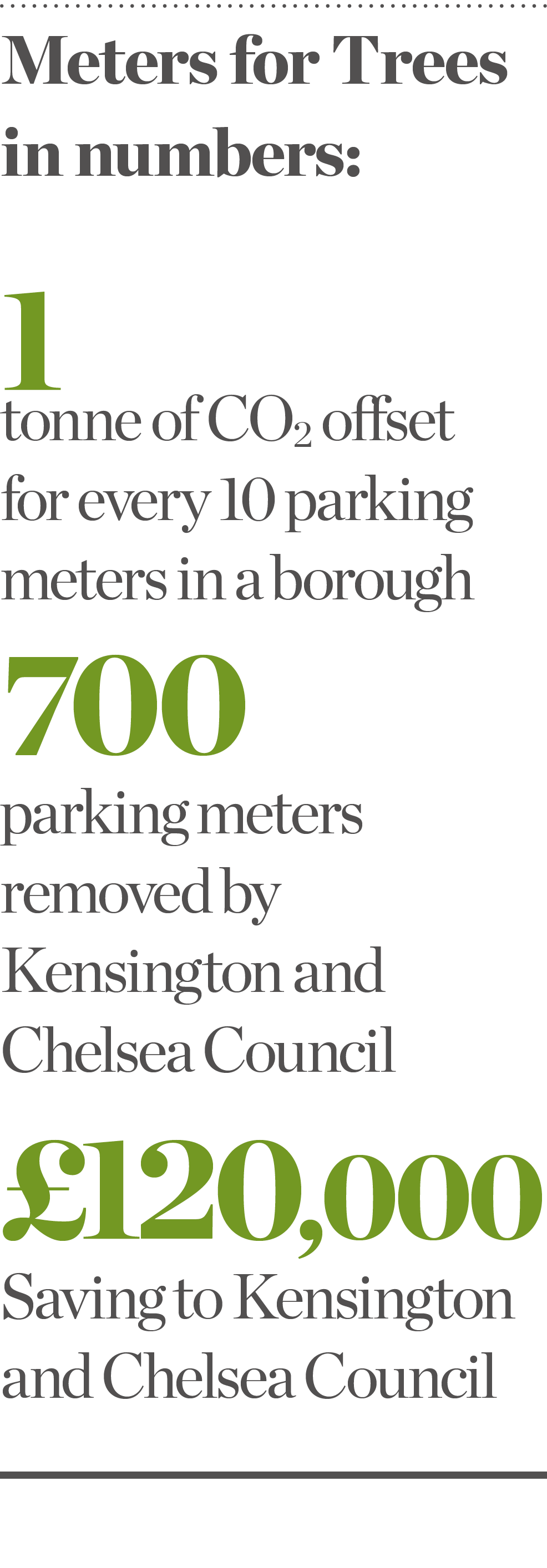
On September 25, the Intergovernmental Panel on Climate Change released its Special Report on the Ocean and Cryosphere in a Changing Climate. The report confirmed that the impact of global warming continues to wreak havoc on our planet, pushing us closer to a global climate disaster.
Since implementing Meters for Trees, London’s Kensington and Chelsea Council has removed 700 machines, equating to 70 tonnes of carbon dioxide being offset in the Amazon
While troubling, the report’s findings came as little surprise. In anticipation of such an outcome, many governments and businesses have begun to change their operations to put sustainability first. However, it’s no longer enough to simply become more environmentally friendly; institutions must operate in a way that actually benefits the environment. Customers and communities are demanding more ethical goods and services, while suppliers and shareholders want greater transparency and expect to see growth driven by business strategies that are underpinned by green thinking.
Green growth
PayByPhone, a wholly owned subsidiary of Volkswagen Financial Services, is one of the fastest-growing mobile parking payment companies in the world, processing more than £300m (€336.25m) in payments annually. The company helps consumers pay for their parking easily and securely, offering a remote top-up function. Since I joined the company in 2018, it has developed a strategy that encourages rapid growth in the UK while pushing sustainability to the top of the agenda.
To offset its own emissions, the company went through a rigorous assessment process so it could properly manage its carbon footprint. In the spring of 2019, PayByPhone achieved carbon-neutral status in the UK. It is also planting trees near its UK headquarters and offsetting its carbon footprint by backing the Portel-Pará REDD project, which works to prevent deforestation in the Amazon.

PayByPhone has also launched Meters for Trees, its biggest sustainable and environmental initiative to date. The scheme incentivises local authorities to scrap their parking machines in favour of PayByPhone’s cashless parking payment technology. The company has committed to offset roughly one tonne of carbon dioxide for every 10 parking machines in a borough by donating one tree to the council and saving one tonne of carbon dioxide through the Portel-Pará REDD project.
The programme promotes positive and sustainable change with the removal of every meter. Cashless parking improves air quality by eliminating the need for parking enforcement vehicles to collect cash from parking machines, clocking up miles and emitting harmful carbon emissions.
Putting the planet first
The initiative clearly works. Since implementing Meters for Trees, London’s Kensington and Chelsea Council has removed 700 machines, equating to 70 tonnes of carbon dioxide being offset in the Amazon. The removal of the parking machines also eliminates theft and vandalism on parking machines, which was costing the council £120,000 (€134,000) per year. In addition, the borough has cleaner air because there is no need for the cash collection and machine maintenance vehicles that were previously driving 23,000 miles every year, belching out tailpipe emissions. Following Kensington and Chelsea’s success with Meters for Trees, other UK authorities are in the process of adopting the programme as they aim to reduce their carbon emissions and create a more sustainable parking payment service.
By becoming carbon neutral and helping clients reduce their carbon emissions through Meters for Trees, PayByPhone is driving growth, but not at the expense of the environment. At a time when the need to combat deforestation in the Amazon rainforest has never been more urgent, our initiative offers a straightforward way for councils to contribute to a more sustainable future. Environmental consciousness is at the core of PayByPhone’s business decisions and will remain central to our ethos no matter how successful we become. Whether it’s to increase market share or to expand services, all businesses need to ensure their growth strategies are equally matched to their sustainability agenda. If they’re not in sync, true growth and business value will never be fulfilled.

